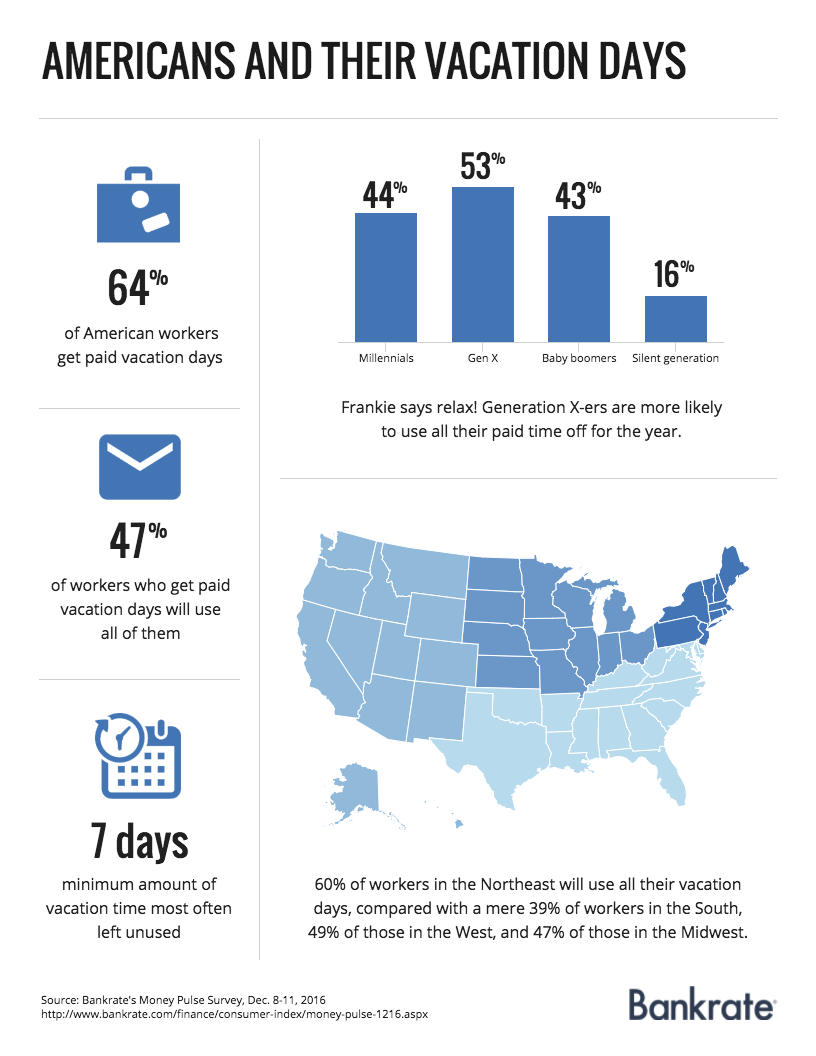Most workers leave paid vacation time unused, a Bankrate survey finds


Work hard, play hard, right? Maybe not. More employees are working harder, with less play. Over half of all American workers who receive paid vacation aren’t using all of the time they’re entitled to, a new Bankrate survey reveals.
Fifty-two percent of Americans who get vacation days say they plan to leave some of their paid time off in the bank — unused this year. That compares with 47 percent who say they will use up all of it. Most workers not taking all of their 2016 vacation are leaving at least one full week of days on the table.
“I get 23 days off a year, and I think last year I had 17 or 18 days left by the end of the year,” says 31-year-old Aaron Lurth, who works as a photographer and art teacher in Decorah, Iowa.

Why we leave vacation time unused
The most popular reason for not wanting to take the full amount of paid vacation days offered is wanting to save up days for next year, followed by having too much work.
Who, in particular, are these non-vacay workaholics? Millennials like Lurth — only younger.
One quarter of young millennials between ages 18 and 25 say they’re not using any of their vacation time this year, versus fewer than 1 in 10 Americans overall.
RATE SEARCH: Build up points for your next vacation. Shop right now for a great rewards credit card.
“I think they (younger millennials) certainly are at a point in their careers and lives where they are ambitious,” says John Challenger, CEO of Challenger, Gray & Christmas, a Chicago-based employment services firm. “This is the time where you are laying the foundation for your career and what to do next.”
There are also regional differences, with 60 percent of Northeasterners saying they’ll use all of their paid vacation time compared with a mere 39 percent of Southerners. Vacation time also cuts across party lines: 15 percent of people who identify themselves as Republicans say they’ll take no vacation time, compared with 6 percent of Democrats.
A culture of work, work, work
One underlying reason that so many workers of all stripes are reluctant to take their vacation time is the work ethic that’s embedded deeply into American culture.
“Maybe it’s an internal thing,” says Lurth, “but I start to feel guilty when I leave because I feel like when I’m away, I’m making more work for others, or I’m worried I am going to make more work for myself when I come back.”
He blames those internal struggles on a culture that he says is “built around working long hours.”
Americans are the hardest-working people in the world, says former Deputy U.S. Labor Secretary Seth Harris, who adds that it’s not just a statistic — it’s an expectation.
“Workers get those signals very clearly and many are afraid to take the time they’re entitled, even if their employer explicitly offers them vacation time,” says Harris, currently a member of the public policy and regulation practice at the Dentons law firm in Washington, D.C.
RATE SEARCH: You need a vacation — and a vacation fund. Shop Bankrate today for the best high-yield savings rates.
Vacation is good for you
Many employees might worry that if they take their allocated time off, they’ll be seen as slackers or lacking in commitment. The survey found that a majority of U.S. workers (56 percent) would prefer one week of pay instead of one additional week of paid vacation time.
“Nobody sees the cash,” Harris says. “Everyone sees the time, especially supervisors.”
Taking the paid vacation time you’re entitled to and recharging every now and then can be beneficial to your career. “We would all be much better off if every employee took the paid vacation time that’s provided to them,” says Harris.
Challenger agrees.
“That could be really valuable when you come back refreshed and better able to manage your tasks and the work that’s in front of you,” Challenger says. “It gives you a fresh perspective.”
RATE SEARCH: Maybe you need a fresh mortgage, too. Shop for a refi mortgage today.
Methodology: Bankrate’s Money Pulse survey was conducted Dec. 8-11, 2016, by Princeton Survey Research Associates International with a nationally representative sample of 1,000 adults living in the continental U.S. Telephone interviews were conducted in English and Spanish by landline (500) and cellphone (500, including 305 without a landline phone). Statistical results are weighted to correct known demographic discrepancies. The margin of sampling error is plus or minus 3.7 percentage points for the complete set of data.
Why we ask for feedback Your feedback helps us improve our content and services. It takes less than a minute to complete.
Your responses are anonymous and will only be used for improving our website.




